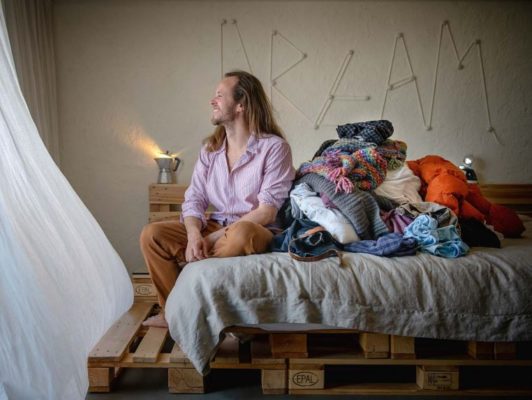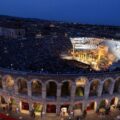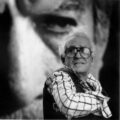March is a special month for the AbanoRitz, chosen not by chance by Terry and Ida Poletto to be dedicated to a dream, a project, a reality: the realization of the Super 8, that we invite you to discover, week by week. Eight authors stayed in our hotel, but more precisely in our rooms at the fifth floor: our Creative Rooms. Eight rooms, eight writers, eight telling.
This week we read Orso Tosco, writer and scenarist class 82. He published various short stories in Watt and other revues before his first novel: Waiting for the Castaways (Minimum fax, 2018). A real representation of the secret motivations that push us to live until the last breath. He dedicated a tale to the room 510 “Recycling” that he introduces us with
“The return”
A habit is the attempt to create a ritual without inconveniencing the gods, and every ritual is the attempt to persuade the magic of an unrepeatable moment to be repeated. That was their ritual. When Pietro returned to bed after his shower, Clara would purposely be lying on her side, turning her back to him. She would appear half-asleep, distant (in fact she would hear everything, like a pond or a spider web). So, he would lie beside her and, while modeling himself on the contour of her body, with his own body he would assume the same position, forcing his knees and chest to be at the exact same angle. Then, after having noticed the wonderful way the light seemed to fizzle over the red blonde locks of her hair, he would begin massaging her neck. He would observe the freckles peppered across her shoulders, so similar to grains of fresh wheat, and try to join them all up, so as to form a sketch. He would attempt to conjure up a formula which could explain their irregularity. However – inevitably, wisely – she would interrupt the man’s search by pushing her head back and arching her back, her body thin and pale, so that their mouths could meet, upside down, like the trembling parts of a mechanism which needs an unusual but precise, sharp dovetail joint to activate it. At that moment, outside the window of their room – the same one, just like every year – a pigeon was making its strange sounds, muddy and guttural. It seemed as though it was doing it so that their bodies could find a rhythm to follow. Just like a gift, the sound of the pigeon was functioning as a metronome for their love, which was reinvigorating after all those, far too many, days of neglect; that love, unpardonable and inevitable, invincible and eternal, like the flaw inside an imperfect diamond. “Our Last Tango in Paris”, Clara would say while laughing, “but the opposite”. Of course, that was a way to defuse the situation, to chase away the idea, with a smile, that both of them were betraying their respective spouses. However, that statement hid a profound truth. While in Bertolucci’s film the two main characters base their initial sexual chemistry upon the lack of reciprocal acquaintance, they, Pietro and Clara, reinvigorated the need and joy of repeating that secret ritual of theirs every year for the exact opposite reason. They did it just because they knew each other well, very well actually, just because they were used to seeing each other habitually, even though in different roles. They spent Christmases together, they celebrated their birthdays together and they shared weddings and family tragedies together, just like it is supposed to be between brothers-in-law and sisters-in-law. Pietro has never wanted to return to that hotel since Clara died. He only changed his mind after losing his wife as well. In truth, to some mourning resembles a strange form of pregnancy, a time which not only imposes cravings, maybe bizarre on sight, but also and mainly gives the privilege to allow those cravings without too many second thoughts. So, here is Pietro, back at hotel AbanoRitz after ten years exactly. Naturally, he requested to stay in the same room where he used to spend the weekend with Clara. If it is true that each love story is a ghost story, it is equally true that each ghost story is a story of habits and surprises. Pietro’s first surprise comes from what the room looks like, which is completely different. The owner of the hotel tells him about the reasons for the change, the decision, made together with her sister, to dedicate an entire floor of their hotel to special rooms, characterized by a unique style, completely unrelated to the context of the rest of the hotel. His room, number 510, is the “Recycle” room. The armchairs are made of pairs of jeans joined together to form the seats and backs, the bed sits on pallets, one of the reading lights is set inside a coffee pot and the lampshade which hangs from the ceiling was, in its previous life, a bicycle rim. The second surprise, a brutal one, strikes him that evening, when, after a day spent between the hot waters of the swimming pools and the regenerating mud baths, he finds himself having an aperitif while waiting to have dinner. The spacious salon is nearly deserted. The velvets of the small sofas and the armchairs muffle sounds, and the carpets make resounding steps similar to a swish, like the needle on a record-player which has come to the end of a record. Pietro is purposely drinking on an empty stomach to concentrate on the heartburn imposed by his gastritis rather than his melancholy. He distractedly observes the photos hanging on the walls of the room celebrating the history of the hotel. It is with those same distracted eyes that he finds himself in front of Clara, a photo showing Clara smiling, hugging her husband, his brother. Pietro cannot believe it. Discovering that Clara came here with his brother means betrayal, the destruction of their ritual, a desecration made even more horrible by the impossibility of being able to hold that against her. Dinner becomes a hateful option, impossible to bare. It is necessary to drink more, to drink until reaching the right level of drunkenness, when you do not feel shame anymore, when you can afford the luxury of speaking to yourself in public, swearing while munching nuts and crying angrily. Pietro returns to his room, to their room, which suddenly appears to him under a different light. The room has let itself change to help him, not to make him reflect on the hypothesis that Clara had come here with his brother too. Room 510 has let itself change so as not to retain any traces of betrayal. It should appear merciful to him, but instead, it worsens things. It worsens things as Pietro realizes that he has returned just to feel the worst possible kind of pain, anything that can rouse him, wake him up again. When pleasure is irreparably compromised, evil, on the contrary, is always within his grasp. He drinks what is left of his gin tonic and orders another one, then he goes out to the balcony. He ignores the sky and the chilly air, continues speaking to himself, insults himself, curses her and hates himself, as he would give much more than he owns to have her back, even for just a brief moment, even to just watch her go, her legs too thin to be straight and her protruding hips. But she does not return. Nothing returns. The other gin tonic arrives and Pietro wants to pay for it straight away. He insists, hoping that a generous tip will overshadow the pitiable state that he is in. He drinks in large gulps, the ice against his teeth, the sour taste of the lemon, the want to scream. Then suddenly, he remembers a detail. He returns to the balcony, he moves the table and the vases, looking for a sign and he finds it. Many years before, like a teenager, he had carved his initials and Clara’s into the hidden part of a wall, the only spot in the room which had escaped the repairs and the new coats of paint. He drinks again, he forces himself to drink. Seeing their initials calms him down, it introduces him to a different kind of pain, broader, denser, a welcoming calm pain. He finds himself considering the possibility that Clara had done well, that taking her husband to that room was a way to tell him the truth without hurting him. Lying beside her husband, Pietro’s brother, a few steps away from their initials carved in stone, in the middle of their ritual – Pietro realizes this while drinking and stops cursing – amounts to her making amends. Naturally, no compensation can ever make amends for the wrong done, without exceptions. Nevertheless, for the first time Pietro manages to feel guilty towards his brother, an emotion which, until that moment, he had never allowed himself, fearing he would be overwhelmed by it. So then, perhaps, Clara’s betrayal, her making amends, is also a gift for him, for Pietro. Not being able to return, not even for a second, he decided to fill up the bleak loneliness of an old secret lover with something vivid, because surviving your loved ones is a burden which one must deserve, a gift that has to be atoned for intensely. Pietro looks up at the sky, makes the stars coincide with his last sip and closes his eyes. The sound of the pigeons brings rhythm to his heart, which opens wide. It is impossible, perhaps even pointless, to state with absolute certainty if his heart does it to set its ghosts free or to make them return home.

© Giovanni De Sandre











